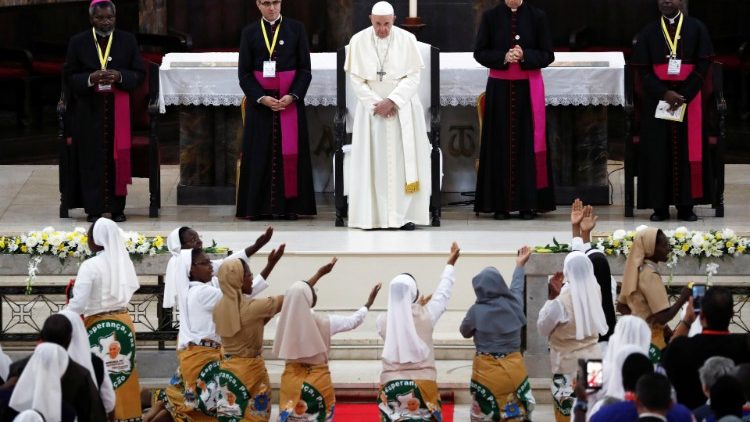Pope Francis was more than the leader of the Catholic Church—he was a fierce and compassionate ally to the African continent, a voice that refused to go silent in the face of suffering, marginalization, and neglect. His legacy across Africa is woven with threads of justice, mercy, and hope, and his absence now leaves an echo that stretches from the deserts of Sudan to the coastal shores of Mozambique.
Africa grieves not just the loss of a spiritual shepherd, but of a rare global figure who had the courage to spotlight the silent tragedies that rarely made headlines. For Pope Francis, Africa was not a distant cause. It was family. And he never turned his back on family.
The journey of Pope Francis’ heart toward Africa perhaps began with a boat.
Just four months into his papacy, in July 2013, he traveled to the island of Lampedusa—where countless African migrants had perished in the Mediterranean, seeking refuge and dignity. Standing before a makeshift altar fashioned from a shipwrecked boat, he condemned the “globalization of indifference,” urging the world to see the humanity in every migrant. It was a sermon the world didn’t want to hear—but one he never stopped preaching: “Migrants are to be welcomed, accompanied, supported, and integrated.”
It was a message that rattled political sensibilities in Europe, but Francis repeated it with unwavering resolve—often as a solitary voice against the winds of apathy.
Long before he wore white vestments, the then-Archbishop Jorge Mario Bergoglio was forging ties with Africa. As head of the Archdiocese of Buenos Aires, he responded to a call from Mozambique’s Bishop Julio Duarte Langa, sending missionary priests to serve in the Diocese of Xai-Xai. That commitment to African solidarity, built in humility and action, would only deepen when he became pope.
Pope Francis’ trips to Africa were not ceremonial gestures—they were brave pilgrimages into the heart of human pain and perseverance. From his groundbreaking 2015 visit to Kenya, Uganda, and the war-ravaged Central African Republic—where he chose not to wear a bulletproof vest—to his powerful visit to South Sudan in 2023 alongside ecumenical partners, he chose presence over protection.
In Bangui, at the height of sectarian violence, he walked into the PK5 district—once deemed too dangerous for any non-Muslim—and entered the central mosque with open arms. The city held its breath. But the warmth of the imam, and the tears of the people, said everything. The pontiff did not come as a politician. He came as a brother.
Over the years, Francis would travel to Egypt, Morocco, Madagascar, Congo, and Mauritius, always carrying a message of healing, reconciliation, and dignity. He urged global powers to stop treating Africa as a resource depot—famously declaring in Kinshasa, “Hands off the Democratic Republic of Congo! Hands off Africa!”
Whether he was championing fair vaccine distribution during the COVID-19 pandemic or spotlighting the devastation of climate change across the Sahel and Congo Basin, Francis never tired of lifting the veil on inequality.

He saw beyond statistics—he saw people. He spoke of the displaced not as burdens, but as brothers and sisters. He called out exploitative systems and offered a vision of solidarity rooted in human dignity.
His love for Africa wasn’t confined to its politics or crises. It extended deeply into its culture and spirituality. He celebrated Masses in the Zairean Rite and described it as a liturgical model of inculturation that the global Church could learn from. To him, African spiritual expression wasn’t a deviation—it was a divine beauty. He urged Africans to protect their heritage, honor their elders, and see diversity not as a threat, but as a sacred strength.
As the news of his passing reaches African villages and cities alike, hearts are heavy. Yet, there’s comfort in imagining Pope Francis being welcomed into eternity by the Uganda Martyrs—whose shrine he once visited with deep reverence. He championed the poor, stood with the displaced, and amplified voices drowned out by power and profit.
Africa will remember him not just as a pope, but as a prophet—one who saw its worth, carried its wounds, and spoke its truth.
May his legacy be not only mourned, but carried forward.